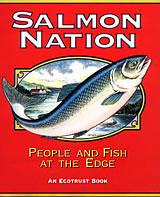Latest Articles
-
Crime Doesn't Pay — But Criminals Do
The European Commission endorsed plans yesterday to make polluting companies and individuals legally responsible for the cost of the damage they cause. The commission will now draft a new “polluter pays” directive for the European Union, intended to end the notion that society as a whole must bear the cost of human-caused environmental disasters. Individual […]
-
Green Apple
The Battery Park City Authority in New York City is holding a competition asking developers to submit plans for the nation’s first eco-friendly residential high-rise. The building must incorporate such features as solar panels, fuel cells, non-toxic and recycled building materials, roof-top gardens, and gray-water systems, which reuse water collected from sinks, showers, and laundry […]
-
Seeking Closure
Enviros are calling on Texas to tighten shrimping restrictions on the Gulf Coast to protect sea turtles, including the endangered Kemp’s ridley turtle. In 1999, shrimp fishing was responsible for the stranding of 95 Kemp’s ridley turtles and 355 other turtles, and the vast majority of them died, according to members of the Sierra Club […]
-
City Sickers
Air pollution is rampant in Russia, where about 120 cities have noxious gases in the air at more than five times acceptable limits, according to the head of the nation’s ecology committee. In all, 61 million people living in 185 cities — more than one-third of Russians — breathe air with high noxious gas levels. […]
-
More Than Meats the Eye
8 pounds of grain are needed to produce one pound of beef 2,464 gallons of water are needed to produce one pound of beef 40 percent of grain is fed to livestock, poultry, or fish China’s grain consumption increased by 40 million tons between 1990 and 1995 — and 33 million of those tons were […]
-
Do you know where your salmon comes from?
Thirty percent of the world's salmon now come from hatcheries, but wild fish account for only another twenty to thirty percent. Almost all of those wild fish come from waters around Alaska and British Columbia, northern waters where runs are mostly intact. These are the waters from which we harvest volumes comparable to those native people caught for thousands of years, that is, in those places largely unmanaged. The biggest share of the world's salmon consumption, however -- now forty to fifty percent -- comes from farmed fish, salmon raised and fed artificially in net pens their entire lives.
-
Go West, Old Man
The Clinton administration, which raised the ire of many Western Republicans last month by creating three new national monuments, is considering designating more monuments in Arizona, California, Colorado, and Oregon, Interior Secretary Bruce Babbitt said Monday. Any new monuments would likely be administered by the Bureau of Land Management, which Babbitt says is becoming a […]
-
Ending Acid's Reign
New Hampshire will join an EPA lawsuit against dirty coal-fired power plants in the Midwest, Gov. Jeanne Shaheen (D) announced earlier this week. New Hampshire officials contend that emissions from the plants, including mercury and sulfur dioxide, are blown into the Northeast where they contribute to pollution and cause acid rain. New Hampshire plants have […]
-
Polluting Young Minds
As an increasing number of teachers across the U.S. add the environment to their lesson plans, corporations are competing with green groups to get their messages and materials into classrooms. For example, Chevron spends about $6 million a year on grants to environmental educators, and the company also produces educational materials on global warming, smog, […]
-
Chills and Spills
A serious cyanide spill in Romania has polluted the Tisza River and angered Hungary, which is downstream from the accident. The Hungarian media have been filled with reports of dying fish, birds, and other wildlife, and towns along the river in central Hungary have been forced to close their water intake systems, officials said. The […]
